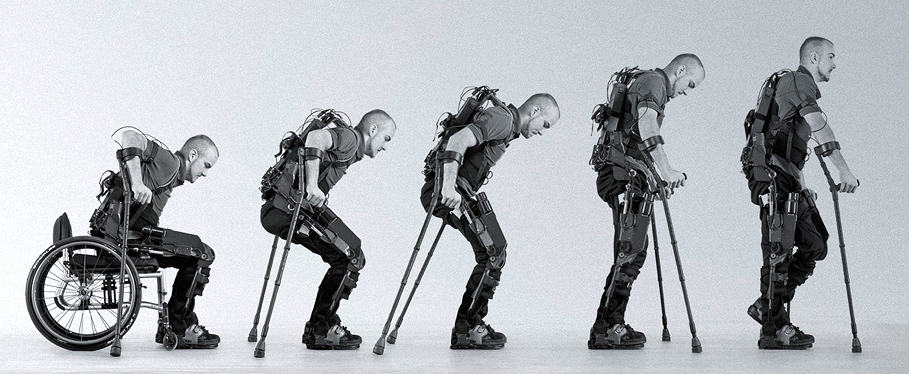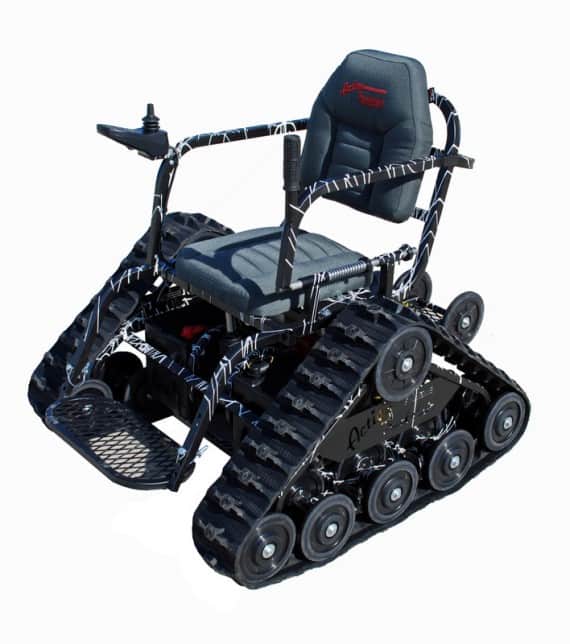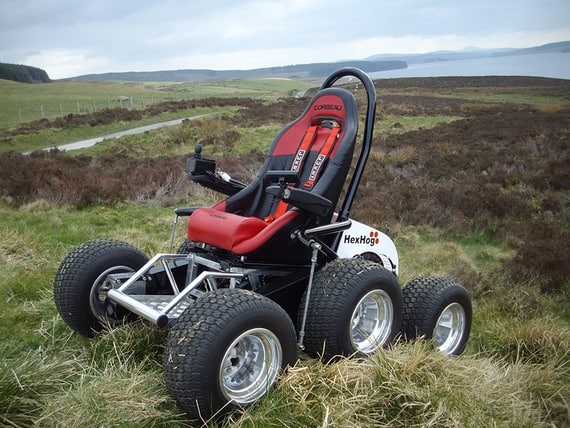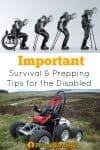I’ve got a disabled person in my life who I care about deeply.
One of my greatest fears is that, in a SHTF survival situation, I will have to leave him behind to protect the rest of my family.
Forget the “every man for himself” mentality. I’m going to do everything in my power to make sure that my disabled loved ones have a shot at surviving!
Here are some of the prepping and survival tips I have for people with disabilities (they also apply to the elderly, although we have a post about elderly prepping tips here).
Please let me know if you’ve got any more ideas!
Know Your Weakness
The most common disability affecting adults is mobility issues. According to the CDC, 1 in 8 American adults have a mobility disability.
My friend has a mobility disability. He doesn’t use a wheelchair but does have trouble walking and definitely cannot run.
In a situation where we’d have to walk a long distance to get out of a danger zone, he could be a liability for the entire group. So, in his case, his main weakness is fleeing.
Here are some other examples of prepping weaknesses that disabled people may have:
Examples of Weaknesses
- Hearing Impaired: Communication
- Sight Impaired: Fleeing, sheltering in place, finding resources, utilizing resources (such as being able to filter water)
- Mobility Impaired: Fleeing, sheltering in place
- Cognitive Disabilities: Resource utilizing, decision making
- Medical Disabilities (such as requiring a respirator): Susceptible to grid-down
Compensate for Weaknesses with Strengths
Let me point out that we all have weaknesses in our survival and prep plans. It is impossible to be 100% prepared for everything.
However, people with disabilities are going to have inherent weaknesses. If these weaknesses can’t be overcome (which I will talk about in a minute), you need to focus on building other strengths.
For example, If your weakness is the inability to flee (Bug Out), you better store extra prepper food and supplies.
Can You Overcome Your Weakness?
Having a disability doesn’t make you helpless. There are even a lot of ways that you can completely overcome your prepping weakness so your disability doesn’t become a liability. Here are some examples:
Weakness: Fleeing
Solution: Get a well-stocked hidden bunker
Weakness: Communication
Solution: Devise an alternative communication plan
Weakness: Resource utilization
Solution: Practice using your supplies and equipment; run extra test drills
Use Technology to Your Advantage
If you can afford it, then there are a lot of technological resources that you can use to your advantage when prepping with a disability.
For example, my mobility-impaired friend told me about this extraordinary exoskeleton made by the company Ekso Bionics (pictured below).
It is a robotic suit that mobility-impaired people can wear to help them walk.

Strength in Numbers
One of the biggest mistakes people make when prepping is taking the “lone wolf” mentality. But people simply aren’t like that. We have survived through the millennia with strength in numbers.
If you have a disability, then strength in numbers will be critical. Start searching out a prepper community near you – or consider relocating to a prepper community.
Regardless of whether you are disabled, I suggest that all preppers read this post on how to build a survival group.
Consider How Grid-Down Will Affect You
Many disabled people rely on special medical equipment which runs on power. In a grid-down event, these people are going to be particularly susceptible.
Make sure you consider how a long-term grid outage would affect you.
Don’t forget about the risks of EMP frying your electrical devices!
Now is the time to:
- Get back up batteries for your equipment
- Buy a generator
- Invest in renewable energy for powering your devices
- Build a Faraday cage and keep a backup of your essential devices in it
Stock Up Your Medications Now
If you require particular medications for your disability, you need to stock up on your medications NOW. Again, this prepping advice applies to all people, not just those with disabilities.
Make Your Bug Out Plan
I’ve been following the news about the Syrian refugee crisis as a lesson in SHTF survival (regardless of the politics, following the refugee news is a great way to see what problems arise when people need to bug out or flee).
One thing constantly strikes me: the pictures of refugees in wheelchairs. While other refugees were slipping through holes in fences, the disabled refugees were stuck in the mud in their wheelchairs.
To compensate for your weakness in fleeing, you must make your bug out plan very carefully.
Memorize your local area.
Plan your Bug Out Vehicle – like getting off-road wheels for your wheelchair.
And, most importantly, GET OUT EARLY! Don’t wait until SHTF to flee. By then, the roads will be too congested, and your options might be exhausted.
Here are some cool wheelchair options for disabled preppers.


Be Ready to Bug In
Even if you take the extra steps of making a good bug-out plan and securing a bug-out location, you still have to be ready to bug-in. Here are some of the extra steps that people with disabilities will have to take:
- Improve your home security
- Get extra supplies for long-term bugging in
- Consider a hidden bunker
Have Your Medical Info in Your Emergency Binder
One of the most common things that preppers forget is to make an Emergency Binder.
An emergency binder contains all the essential information you need if you have to flee, such as your passport, ID, and contact info.
Disabled people will want to go the extra step of ensuring that it contains all their pertinent medical info and medical history.
Are you disabled, or have disabled people in your life? How is this affecting your prepping and survival plans? Let us know in the comments.



I’m a disabled prepper with mobility issues (transfemoral amputation and a rickety back so I cannot walk far or haul heavy stuff around). But I manage mostly on my own.
For the hauling and heavy lifting I use the old low-tech sailors method of pulley systems, and a cart to wheel stuff around in. For the getting to places: a good reliable van that can be used as a liveaboard bug-out solution and an all-terrain wheelchair.
My motto: if the legs (or any other part of your body) don’t work, use your brains! It’s all about being adaptable and especially, not insisting on doing things exactly the way the non-disabled do them. An example: you are on crutches and have to bring a cup from spot A to spot B. No-one is around to carry it for you. Well, you have a mouth, don’t you? Or, much better: you figure out a system that will hold your cup without tipping it over while you move to the nearest seating area. (A braided cup carrier you can wear around your neck, for example.)
Disabled does not mean unable when you think outside the box.
Awesome perspective! I too have mobility issues (3 back surgeries in 1 year, the last leaving me wheelchair-bound for a year). I hold a Masters in engineering, so I’m no dummy. We strategically relocated to the MOzarks 7 years ago and I’ve gotten very creative to accommodate my limitations. Although my husband is active duty Army, I can’t rely on him being here if SHTF. I’m all about thriving and defense. Best of luck to you in your own journey.
To my fellow disabled (and non disabled people) I’d say: learn what works for you and practice those evacuation and survival skills. If as a disabled person with reduced mobility you are worried about being left behind: learn a useful skill such as plant medicine and recognizing wild edibles or natural navigation (i.e. without a compass) to exchange for the help that you need if SHTF. Non disabled people may be more disabled than you are regarding some survival skills and they will gladly accept your help and your teaching even if that means that they have to physically carry or cart you around with them!
The human species survived for so long not because of our (very insignificant) physical prowess but thanks to our capacity to share knowledge and work together as a team. Never forget that.
I have reduced mobility and use my van as a bug-out vehicle. It has an extra gas tank, and inside there’s a bed and everything I would need for over a week of autonomy. Of course I’d have to bug out before all the roads are blocked but it feels good to have options. Also, I often use it to go on roadtrips: it’s good exercise and lots of fun! Non disabled people are often amazed about the autonomy I have and my “courage” to drive off on a whim. (What courage? I’m on holiday man! )
Some of your ideas seem grandiose honestly. Who can afford to have the things you’re suggesting to bug out for disabled people? For some of us just sheltering in place is going to be all we can do. And stocking up on medications sounds great, but insurance companies only let you have so much at a time. Most people can’t afford to buy all of their medications out of pocket either.
Another thing to add to your SHTF stockpile: at least one backup pair of prescription eyeglasses! Anyone who needs glasses to get around should have a backup pair, either an old pair with a slightly out-of-date prescription or a duplicate pair bought for cheap. (These are good to have even in a non-SHTF scenario in case yours get lost or broken, so you’ve got something to wear while you get them replaced.)
some Dollar store glasses will work for some people.
I’d like to add a suggestion for those preppers who are able to use them. Buy a bicycle for each family member and a cart for at least one of the bikes in which to haul your supplies and bags. You may need to escape quietly in the dark of night or fuel may be unavailable for your cars or motorbikes. Bicycles will also allow you to utilize routes that vehicles can’t access. Keep your bikes ready to go at all times. P.S. you don’t need expensive bikes, just trustworthy ones. And make sure you have bike repair tools as well. Additionally, another suggestion, all preppers should be carrying a lighter in their purse or pockets. Even if you don’t smoke, a lighter can do many things, as well as providing you instant fire starting ability.
thanks for the great article,Being disabled, limits me some what but i’m not a hazard. to any group.being a loan wolf. for a very long time.I take care of all my chores,I don’t need help all the time, 2 cycle engines, I stay away from. IE chain saws.
keebler. in Va.
Stock up on Epi-pens and AviQu if you can. According to my allergist they are still fine to use well past their expiration date, as long as there is no discoloration of the liquid.
I have a disability and so does my partner. We are long time preppers. The first thing you need to do is to get allies. We have family nearby and we also have resources that we can share. We are armed and have taken firearms courses. Next you need to have the gear to get from your location to a bug out location. We also have equipment to make our lives easier. Medical supplies are going to be iffy. Our doctor will give us 90 day meds. We are also have solar panels available to use. We have a few ideas for bugging out. EMP attacks do concern us so we have a faraday cage for our backup gear.
Good sensible preps there and achievable by most with a bit of planning and foresight.
I think if you live on social security disability income only, live in a not that safe of a place, can’t walk for more than 50 steps without having to set down from losing feeling in feet, also have a 12 yr old granddaughter to take care of and little family, all of whom think that prepping is stupid then you may be doomed.
The odds are stacked against you for sure but no reason not to make sensible preparations for the things you can control.
That’s me minus the kid. I have a plan anyway to survive as long as I can. Dollar Stores are a source of canned food, otc meds, and other helpful stuff. Giving up ahead of time is self destructive.
I have done this in the past when I moved from overseas back to US. If you can afford to, after you get your prescription refilled (like a day or two later) I’ve lied to say my pill bottle was accidentally thrown out and I have gotten another refill (though I had to pay for it) gives you and extra 30days
Not something we would recommend, but in a survival scenario normal rules do not apply…
I have narcolepsy with cataplexy, so my mobility is unpredictable. The plan? We’re buying our land and setting up off the grid. I will use St John’s Wort to replace my cataplexy meds. It is the old treatment and I have already tried it and know that it works for me. Other then that, it’s all about the planning and getting started before SHTF.
Yes its all in the planning Vicky. Thanks for sharing your tips.
For those carrying for a disabled loved one with respiratory issues, learning CPR Should be a priority as there could be potential for the absence of access to oxygen in a SHTF scenario. Also, my doctor is on prescription medications for Epilepsy so stocking up as you suggest isn’t an option. I have not figured out what I will do yet in a rare case that she runs out of meds. I may need to stock pile cbd oil just in case IF that would even work for her. She is also cognitively impaired so I secure all of her life saving items in my bug out bag to reduce the risk of her losing them or forgetting them. She needs extra time processing things do in a bug out situation I will be shoving her out the door so I have her bag prepared already so she has less to concern herself with.
Kristie,
If her medicine comes in a higher dosage you could tell her dr about your prepping concerns ( just use the most common danger for your state like earthquakes for CA) and see if the dr will give her the stronger RX. Then you can get a pill cutter and cut them in half or quarters so she’s still taking the lower dosage but you should then have extra medicine.
Personally with my migraine medicine I only need 20 Mgs and after telling my dr about my earthquake concerns she rewrote the RX for 40mgs so I only take half a pill ( it’s still written as 1 for the insurance). This means I can save a bit now.
Of course triptans aren’t controlled I don’t know if a Dr would be willing to do it with controlled medicine but it cannot hurt to bring up the concern. Your dr might have other solutions
Kristie my son seems to have a lot of the medical issues you are speaking of try to stock up on emergency seizure meds like refilling diastat as much as possible. Also try CBD oil while you have time to see if it works and what dosages to use. I hope this helps.
My insurance allows me to fill meds a few days early. This let’s me set aside a day or two worth of meds each month. It takes awhile to build up a stockpile but it’s better than nothing. You can ask your doctor about giving you samples of meds if they have them
Good advice! What about medications such as insulin that you can only get so much thru your prescription. So therefore you are not able to stock up. 🙁
have frozen bags in the freezer…maybe in the garage… with three Insulated cooling bags ready for the insulin. (3 as in 72 hours) Even the type 2 on pills needs to have some plan. Fill a shoulder bag with up to 20lbs and take walks of up to 1 mile daily to keep muscle tone up for those more strenuous SHTF moments you will traverse. Pills need daily compartment storage and consider Low sugar Emergency paks in your plan. dark chocolate will react faster than milk chocolate and will keep longer. see other shock prevention methods or treatments.
Appreciate the info. Should be helpful to many. Thanks.
This is location-specific, but check the section called “refrigeration.”